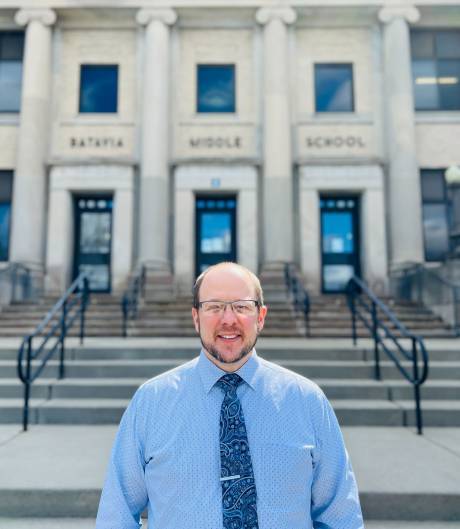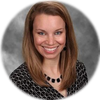
Ninety to 120 every day.
That’s a goal that Batavia Middle School has set for students: to do purposeful reading, writing and interactive talking for 90 to 120 minutes each weekday. Principal Nate Korzelius introduced that as one part of the middle school’s strategic plan.
“So we've spent a lot of time this year looking at and reflecting on our vision and mission, as well as our strategic plan and empowering students, and within the vision statement, working with the community, creating a nurturing environment for our students,” he said during a presentation to the school board Monday evening. “So that was our starting point, as we were looking at our middle school goals for the year. And then, in the past year, establishing the strategic plan: create and maintain a safe and orderly school environment, collaborative culture theory, accessible curriculum, and effective teaching in every classroom.”
A leadership team activity during the summer led middle school staff “to come up with tangible things to meet our students where they are, trying to adjust for some gaps that have occurred as a result of COVID.”
“And also just find ways that we can creatively build a culture of learning and also try to break down some barriers for students,’ he said. “So, beginning this school year, this was the goal that I outlined for the staff on day one. Our goal is to promote authentic literacy practices by increasing purposeful reading, writing and discussion as moments of both learning content and critical thinking.
A daily dose of literacy
"So specifically, what we've worked on the most so far this year are ways we can ensure that students will participate in 90 to 120 minutes of purposeful reading, writing and discussion every day,” he said.
That’s likely good practice for anyone. A quick online search produces several articles about the benefits of reading, such as Healthline’s claim — using MRI scan results — that reading involves a complex network of circuits and signals in the brain. As one’s reading ability matures, “those networks also get stronger and more sophisticated,” the site states.
Teachers will introduce various methods for kids to accomplish the daily goal, such as having guest readers, creating reading quizzes, writing letters or a daily diary, hosting debates and asking open-ended questions.
“We have data meetings every couple of months. But then we want, now especially that we have more access to data post-COVID, to focus on those, and establish the needs for our students to make sure that we can individualize things as much as possible to meet students where they are,” Korzelius said. “Those teams are focused on the individual needs of students and customizing the approach for students within their teams.”
Beginning Tuesday (Nov. 15), students will have a task during Lunch Learning Lab, which means at the beginning of the second marking period, each student “is to drop everything and read” a book for 20 minutes. District officials contacted each household to notify parents of this initiative, and to encourage them to find out what might engage their child.
“Half the battle is to find something that they’ll enjoy reading,” he said.
Teaching strategies
The focus isn’t just on students, though. A shared Google Classroom will begin in the next month for all middle school faculty. It will provide a list of various strategies for teachers to try — one at a time for a month — and then report back on how it went and offer suggestions for improvement before selecting another strategy the next month.

“And really, what I found through all my experiences, if you don't have that SEL piece, it's going to be really hard to get that academic piece. And I think in general, we've all learned that from COVID times, and so we've spent the last year or so really establishing our SEL committee,” she said.
Circle Up Fridays happens on the first Friday of every month, and includes an extended homeroom time so that students and staff can literally “circle up” to engage in meaningful conversations, she said.
This work is about “creating connections at school,” she said, amongst students and teachers. Two years of COVID, isolation and social distancing seem to be ebbing away.
“I really think they're excited that it feels a little bit more, a little back to normal for them like they have loved the opportunity to have dances again … and options to look at trips and those types of things. So I think it's a lot for them on an energy level, you know, it's a much different day coming every day to school versus some of what we were doing in a hybrid setting,” she said. “I think every day that we're getting better and more comfortable.”
Data — a huge component amongst school districts — has been part of the strategic plan, Korzelius said. Pulling people together through regular faculty meetings of about 80 people has also been a positive step, he said.
“We really try hard to focus on our strategic plan,” he said. “Where our goal of mission and vision is 90 to 120 minutes for every student throughout the school day.”
The mission is to empower students to achieve their maximum potential, and the vision includes providing a safe and nurturing environment. The targeted end result is to help students become socially responsible citizens who are able to successfully meet life’s challenges.
School board member Alice Benedict wanted to know if and how data would be collected to show how well the SEL lessons were working. Yes, it will be collected through DESSA, a social-emotional learning measuring tool, and student surveys, Korzelius said.
“It's something that I want us to build on, and just continue to find new and better ideas. I mean, this is a great idea, which is our first time,” he said. “We have to take a look at it at the end instead of just gauging success.”
